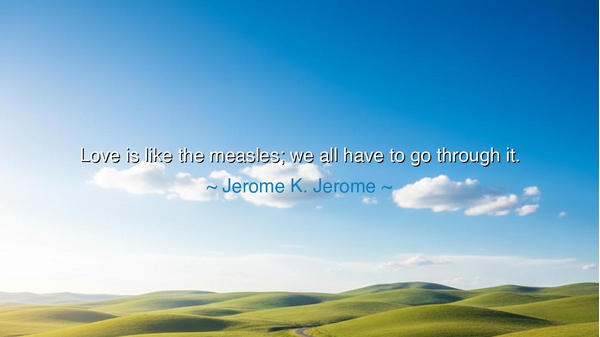
Love is like the measles; we all have to go through it.






“Love is like the measles; we all have to go through it.” So wrote Jerome K. Jerome, the English humorist, hiding eternal truth within the folds of wit. Though he spoke lightly, his words carry the weight of human destiny. For indeed, love, like a fever of the flesh, comes to all, unbidden and unavoidable. None may escape it. It seizes the heart, it burns through the soul, and though it may leave scars, it also grants the wisdom of experience. Like the child who emerges stronger after sickness, so too does the heart, once struck by love, emerge changed forever.
The ancients would have recognized this truth. To them, love was no gentle guest but a god—mighty, relentless, inescapable. The Greeks spoke of Eros, whose arrows pierced even the strongest. The Romans of Cupid, whose mischief brought emperors to their knees. No fortress of reason, no shield of discipline, could hold back the fever once it took root. Thus Jerome’s comparison is no jest alone—it is the recognition that love, like a plague, is a universal fate. To resist is useless; to endure is necessary.
Consider the tale of Antony and Cleopatra. Two rulers of vast power, bound not by politics alone but by the fever of passion. Antony, a general of Rome, could conquer legions, but he could not conquer his heart once struck by Cleopatra’s presence. Their union brought both ecstasy and ruin, a fever that consumed not only themselves but empires. Was it folly, was it destiny? Perhaps both. But like the measles, their love had to be endured, for it shaped the course of history, leaving behind a story sung through the centuries.
Jerome’s words also whisper a deeper wisdom: that love, though at times painful, is part of the growth of the soul. Just as the child who has faced the measles becomes immune, so too the heart that has known love—whether fulfilled or lost—emerges tempered. Even heartbreak, sharp as it may be, teaches compassion, patience, and understanding. Without love’s fever, a soul remains untested, like iron never placed in the forge. With it, one learns both the fragility and the strength of the human spirit.
O children of tomorrow, know this: you cannot forever hide from love. It will find you, as surely as night follows day. It may come as a gentle warmth, or it may come as a raging fever—but it will come. Do not curse it, even when it burns, for in its fire you will discover both your weakness and your greatness. To have loved is to have lived; to never love is to remain as stone, untouched by the breath of life.
The lesson, then, is simple: accept love when it comes, even when it unsettles your peace. Do not flee from it as though it were a disease, nor cling to it as though it could last forever without change. Instead, endure it with courage, cherish its beauty, and learn from its trials. When it departs, give thanks for the strength and wisdom it leaves behind. For like a fever, it passes, but its mark remains upon the soul.
Practically, let each person do this: when love arises, embrace it without fear; when it fades, release it without bitterness. Write your joys and your wounds, so you may remember their lessons. Seek not to avoid love’s trials, for they will come regardless, but prepare your heart to grow through them. In this way, you will transform what others call affliction into a source of power.
Thus, remember Jerome’s words: “Love is like the measles; we all have to go through it.” For love is not a curse but a rite of passage. It is the fever that awakens the soul, the trial that no man or woman may escape, and the gift that leaves us forever changed. Endure it bravely, and you will walk wiser into the tomorrows that await.






AAdministratorAdministrator
Welcome, honored guests. Please leave a comment, we will respond soon